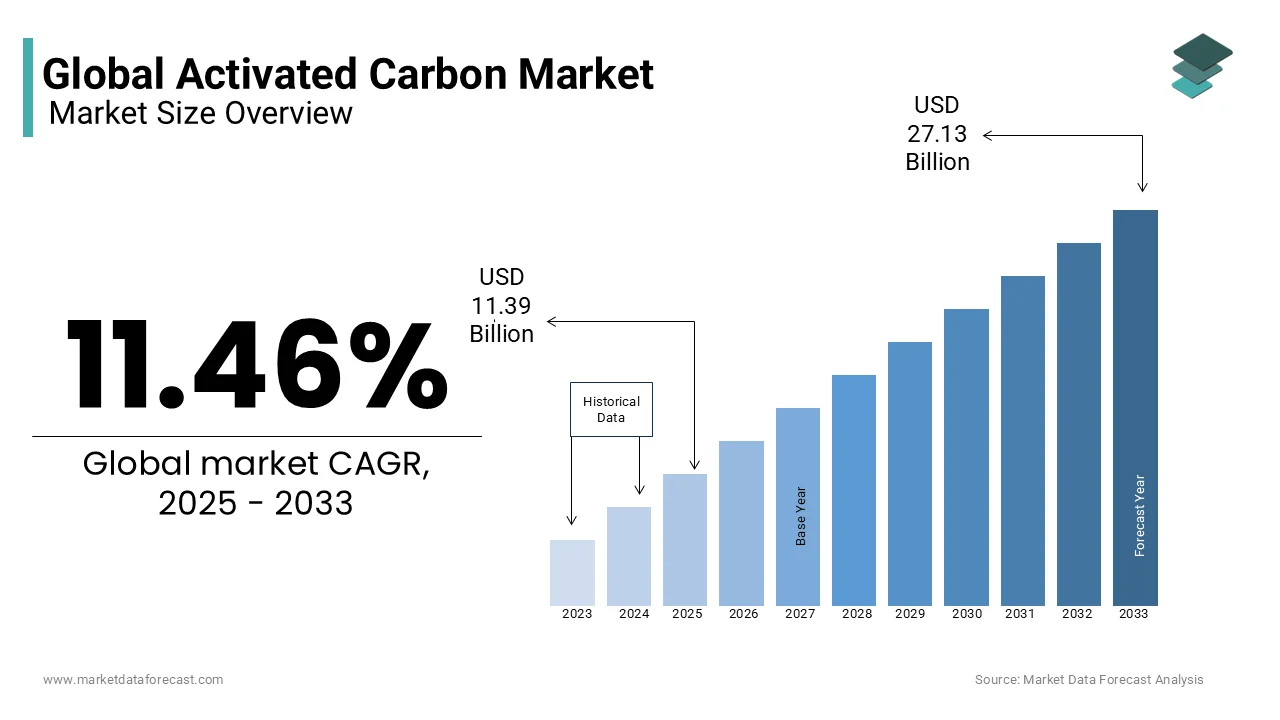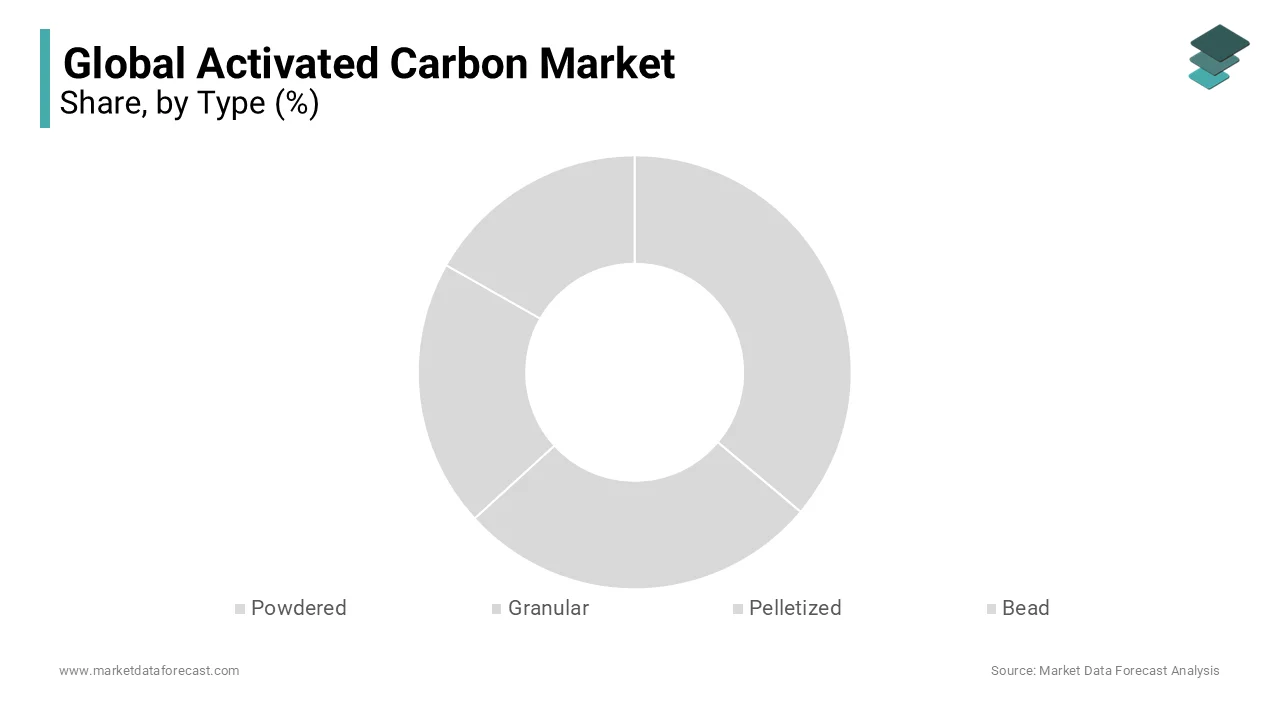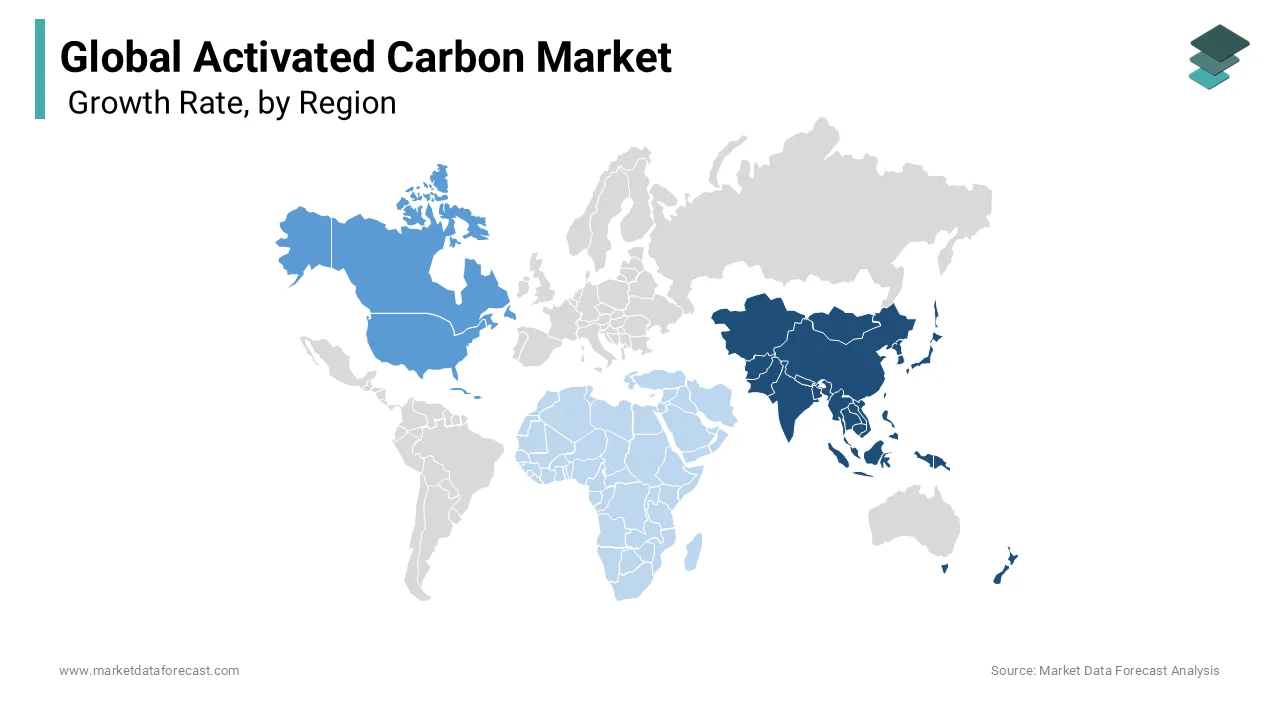Global Activated Carbon Market Size, Share, Trends & Growth Forecast Report By Type (Powdered, Granular and Others (Pelletized and Bead)), Application (Liquid Phase (Water Treatment, Foods & Beverages, Pharmaceutical & Medical), Gaseous Phase (Industrial, Automotive)) and Region (North America, Latin America, Europe, Asia Pacific, Middle East & Africa), Industry Analysis From 2024 To 2032
Global Activated Carbon Market Size
The size of the global activated carbon market was valued at USD 9.17 billion in 2023. The global market is estimated to register a CAGR of 11.46% from 2024 to 2032 and be worth USD 24.34 billion by 2032 from USD 10.22 billion in 2024.

Activated carbon is one of the key features in the adsorbent market worldwide. Its adsorption capacity is high, and it also has a big surface area. Coal, wood, coconut shells, and lignite are the vital raw materials employed for production. It is subdivided into three kinds, namely, powdered, extruded, and granular. Activated charcoal is used mainly in the liquid phase and gas phase applications. The Activated Carbon Market has a decent growth pace in the global market, which is driven by the demand for powdered carbon, mainly in industrial applications. Activated carbon, also called activated charcoal, is a type of processed coal. This allows the output solid to showcase small and low-volume pores that escalate the surface area for adsorption or chemical reactions. It is mainly employed for the purification of gases and liquids in food and beverage processing, chemical businesses, and water treatment.
MARKET DRIVERS
The growing awareness of water and air purification and Y-O-Y growth in the automotive industry for emission control are boosting the expansion of the activated carbon market. The primary health risks of drinking mixed waters are increasing continuously among consumers. Businesses are adopting geographic growth and the latest product advancement as significant strategies to survive in the market. The major drivers in the activated carbon market include international rules governing the discharge of mercury from businesses and rising calls for water treatment chemicals. These are estimated to entail the adoption of these solids to decrease release and ensure the removal of impurities.
The regulatory agencies in different parts of the globe have emanated directives aimed at restraining mercury emissions by a broad array of businesses, including petrochemical complexes like refineries and plants. These include rules, like the Mercury and Air Toxic Standard (MATS) emanated by the U.S. Environmental Protection Agency (EPA) and ratified by the Minamata Convention in the European Union that have been instrumental in holding back the release of mercury and acidic gases from coal-based and other power plants. The application of this carbon assists in efficiently controlling these releases. Hence, the formulation and implementation of such regulations are estimated to boost the activated carbon market by assisting in the rising potential call for these solids in the future.
The primary health risks and dangers related to the oral consumption of impure water are estimated to act as a catalyst for the market call for these solids. Many countries, including China and India, are highly investing in water purification plants that are determined to boost the expansion of the global activated carbon market during the foreseen period. Organic material with significant carbon content is processed to make activated carbon. Physical adsorption is a major characteristic of activated carbon that is helpful for purification, decaffeination, metal finishing, medicine, filters, and getting rid of pollutants and fuel storage. The liquid and gaseous stage of activated carbon improves its uses in getting rid of lead, dissolved radon, other odor-causing compounds, and mercury. The advantages provided by the activated carbon segment will drive the business globally. Activated carbon is usually employed for its decolorization and deodorization characteristics. Rising pollution and increasing awareness about health are factors due to which there has been a slow and continuous expansion of activated carbon in the market. Re-activated carbon is considered as an opportunity for Activated Carbon producers to maximize their profits. The call for activated carbon has escalated highly owing to the stringent rules for air quality, rising numbers of municipal water treatment, and industrial plants.
MARKET RESTRAINTS
The danger of the adoption of alternatives like silica gel and super-sand is providing major competition to the dynamics of activated carbons. Additional factors like low presence of raw materials like phenolic resins, coconut shell charcoal, and wood charcoal (hence causing volatile price trends), and the availability of costly derivatives of these solids are estimated to impede the adoption of these solids, and therefore, constrain the market expansion in the future. The rising demand for activated carbon is directly proportional to operational activities in these businesses; therefore, such attributes are estimated to hamper the expansion of the global activated carbon market. The availability of raw materials may be restricted owing to environmental factors that may cause an increase in costs. This may have a bad influence on the global activated carbon market.
REPORT COVERAGE
|
REPORT METRIC |
DETAILS |
|
Market Size Available |
2023 to 2032 |
|
Base Year |
2023 |
|
Forecast Period |
2024 to 2032 |
|
CAGR |
11.46% |
|
Segments Covered |
By Type, Application, and Region. |
|
Various Analyses Covered |
Global, Regional, and Country Level Analysis, Segment-Level Analysis, DROC, PESTLE Analysis, Porter’s Five Forces Analysis, Competitive Landscape, Analyst Overview of Investment Opportunities |
|
Regions Covered |
North America, Europe, APAC, Latin America, Middle East & Africa |
|
Market Leaders Profiled |
Cabot Corporation (U.S.), Donau Carbon GmbH (Germany), KUREHA CORPORATION(Japan), Osaka Gas Co. Ltd (Japan), Silcarbon Akilotonivkohle GmbH (Germany), Oxbow Activated Carbon LLC (U.S), Calgon Carbon Corp (U.S), Kuraray Chemical Co. Ltd (Japan), Haycarb Plc. (Sri Lanka), and Others. |
SEGMENTAL ANALYSIS
By Type Insights

The granular segment is holding the dominant share of the market. Granular activated carbon has a major application in wastewater treatment procedures. It is the most suitable method to remove contaminants from the liquids, that is, removing impurities from the water, which is suitable for further usage. The major advantage of the granular type is its reusability.
The powdered activated carbon segment is esteemed to have the highest growth rate during the forecast period due to its cost-effective property. PAC is very effective in easily absorbing pollutants. Removing organic contaminants from drinking water is the most common application of the PAC, and it is widely used across the world.
By Application Insights
The liquid phase segment holds the highest growth rate in the market, whereas the gaseous phase segment is forecasted to have significant growth opportunities in the future period. Rising support from the government towards the wastewater treatment procedure is quietly to enhance the growth rate of the market. Also, the growing number of oil and gas industries leverage the growth of the gaseous phase segment. The high absorption properties of the activated carbon showcase wonderful results in stopping the harmful gas through the carbon filter. Therefore, the growth rate of the activated carbon market is slightly inclined toward the positive side during the forecast period.
REGIONAL ANALYSIS

Worldwide, the Asia-Pacific region is estimated to occupy a major share of the global market in the forecast period. Moreover, government rules, the availability of an enormous consumption base, and a major expansion of different end-use industries like water treatment and manufacturing are estimated to drive the market call in the region. The industrial development in growing clusters across the world, like the Association of Southeast Asian Nations (ASEAN), North African countries, and Central and Eastern European countries, is estimated to provide a broad consumption base for this business in the upcoming period.
The North American activated carbon market accounted for the second-highest share of the global business, with a worth of USD 914.3 million in 2020. The increasing pressure from the EPA and the government of the US over the companies to decrease mercury releases is probable to fuel the call for activated carbon in the region. The activated carbon market in Latin America is estimated to showcase high expansion during the forecast period to reach USD 430 million by the end of 2025. Europe-activated carbon business is also foreseen to register a notable growth rate in the outlook period.
KEY MARKET PLAYERS
Companies playing a leading role in the global activated carbon market include Cabot Corporation (U.S), Donau Carbon GmbH (Germany), KUREHA CORPORATION (Japan), Osaka Gas Co. Ltd (Japan), Silcarbon Akilotonivkohle GmbH (Germany), Oxbow Activated Carbon LLC (U.S.), Calgon Carbon Corp (U.S), Kuraray Chemical Co. Ltd (Japan) and Haycarb Plc. (Sri Lanka).
MARKET SEGMENTATION
This research report on the global activated carbon market has been segmented and sub-segmented based on type, application, and region.
By Type
- Powdered
- Granular
- Pelletized
- Bead
By Application
- Liquid Phase
- Gaseous Phase
By Region
- North America
- Latin America
- Europe
- Asia Pacific
- Middle East & Africa
Frequently Asked Questions
1. What is the Activated Carbon Market growth rate during the projection period?
The Global Activated Carbon Market is expected to grow with a CAGR of 11.46% between 2024-2029.
2. What can be the total Power Plant Control System Market value?
The Global Activated Carbon Market size is expected to reach a revised size of US$ 17.59 billion by 2029.
3. Name any three Activated Carbon Market key players?
Cabot Corporation (U.S.), Donau Carbon GmbH (Germany), and KUREHA CORPORATION(Japan), are the three Activated Carbon Market key players.
Related Reports
Access the study in MULTIPLE FORMATS
Purchase options starting from $ 2500
Didn’t find what you’re looking for?
TALK TO OUR ANALYST TEAM
Need something within your budget?
NO WORRIES! WE GOT YOU COVERED!
Call us on: +1 888 702 9696 (U.S Toll Free)
Write to us: [email protected]